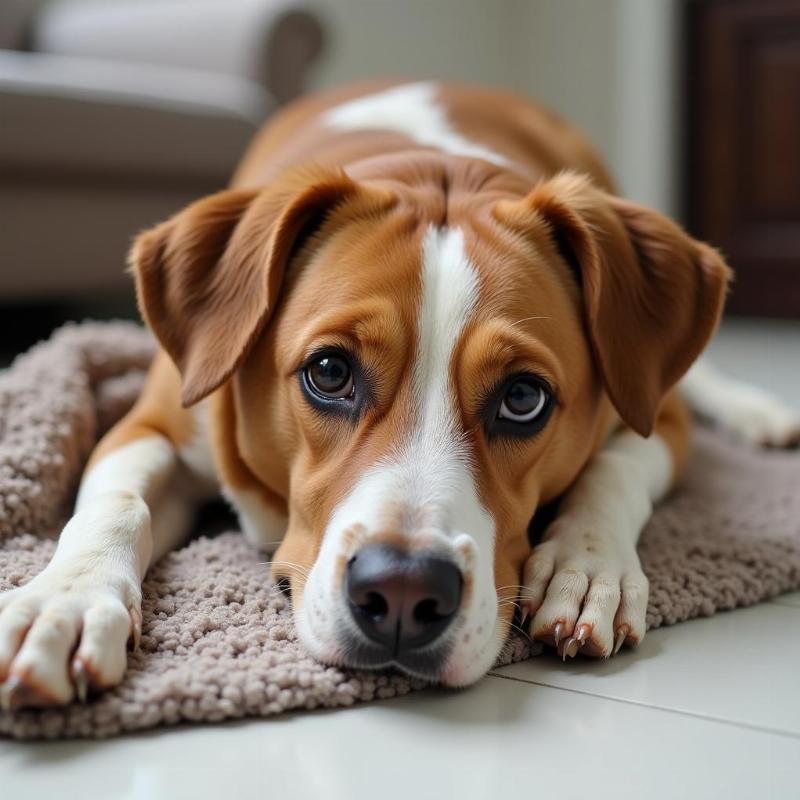Knowing how long to wait to play with your dog after eating is crucial for their health and well-being. Playing too soon after a meal can lead to serious issues like bloat, a life-threatening condition. This article will provide a comprehensive guide for dog owners in the US, addressing common concerns and offering practical advice based on veterinary best practices and breed-specific considerations.
Understanding the Risks of Exercise After Eating
Vigorous activity immediately after eating can disrupt your dog’s digestion and increase the risk of bloat, especially in large, deep-chested breeds like Great Danes, German Shepherds, and Standard Poodles. Bloat occurs when the stomach twists, trapping gas and food inside. This can cut off blood supply to vital organs and requires immediate veterinary attention. Even less strenuous play can cause vomiting, regurgitation, or discomfort.
 A dog relaxing after a meal.
A dog relaxing after a meal.
How Long Should You Wait?
The general recommendation is to wait at least one to two hours after your dog eats before engaging in any vigorous play or exercise. This allows ample time for the food to begin digesting and reduces the risk of complications. For smaller breeds or dogs with no history of digestive issues, a shorter waiting period might be acceptable, but it’s always best to err on the side of caution.
Factors Influencing Waiting Time
Several factors can influence the appropriate waiting period:
- Breed: Large, deep-chested breeds are more prone to bloat and may require a longer waiting period.
- Age: Senior dogs and puppies may have more sensitive digestive systems and benefit from longer rest periods.
- Meal Size: Larger meals require more time to digest.
- Type of Food: Dry kibble generally digests faster than wet food.
Signs of Bloat
Recognizing the signs of bloat is crucial for prompt treatment. These signs include:
- Restlessness and pacing
- Swollen, distended abdomen
- Excessive drooling
- Attempts to vomit without producing anything
- Pale gums
- Rapid breathing
- Weakness and collapse
Tips for Managing Post-Meal Activity
- Provide a Calm Environment: After your dog eats, create a relaxing environment where they can rest undisturbed. Avoid loud noises or stimulating activities.
- Short, Leashed Walks: Instead of vigorous play, opt for a short, leisurely walk after the waiting period.
- Monitor Your Dog: Observe your dog closely for any signs of discomfort or digestive issues after eating.
- Consult Your Veterinarian: If you have any concerns about your dog’s digestion or activity levels, consult your veterinarian. They can offer personalized advice based on your dog’s breed, age, and health history.
What About Water After Eating?
While it’s generally safe for dogs to drink water after eating, avoid giving them large amounts. A small amount of water can aid digestion, but excessive water intake can increase the risk of bloat.
Conclusion
Understanding how long to wait to play with your dog after eating is essential for their health and well-being. By following these guidelines and being mindful of your dog’s individual needs, you can minimize the risk of bloat and other digestive issues, ensuring they enjoy a long, healthy, and active life. Remember to consult with your veterinarian for personalized advice.
FAQ
- How long after eating can I walk my dog? It’s best to wait at least one to two hours after eating before taking your dog for a walk, especially a vigorous one.
- What are the most common signs of bloat? Common signs of bloat include a distended abdomen, restlessness, excessive drooling, unproductive vomiting, and difficulty breathing.
- Can I play fetch with my dog after they eat? No, avoid strenuous activities like fetch immediately after eating. Wait at least one to two hours.
- Is it okay for my dog to drink water after eating? Yes, small amounts of water are generally safe. Avoid excessive water intake.
- What should I do if I suspect my dog has bloat? Seek immediate veterinary attention if you suspect your dog has bloat. This is a life-threatening emergency.
- Are certain breeds more prone to bloat? Yes, large, deep-chested breeds are more susceptible to bloat.
- How can I prevent bloat in my dog? Feed smaller, more frequent meals, avoid strenuous exercise after eating, and use elevated food bowls.
Related Articles
- how long should dogs wait to play after eating
- how to know if dog ate something bad
- prevent dog from scratching door
Beautdogs.us is your trusted source for comprehensive dog care information, breed insights, and product recommendations. Whether you’re a new dog owner or a seasoned expert, we provide expert guidance to help you nurture a happy and healthy canine companion. Explore our website for valuable tips on nutrition, training, grooming, and more. Contact us for personalized support! Email: [email protected], Phone: +1 501-555-7529. Visit Beautdogs.us for all your dog care needs.